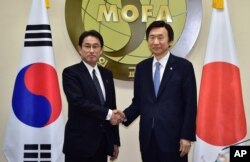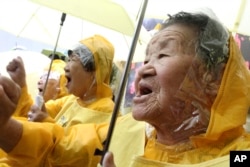Monday’s diplomatic settlement between Japan and South Korea to resolve a longstanding dispute over Tokyo’s sexual enslavement of Korean women during World War II is being criticized by some victims who say it is sacrificing justice for political expediency.
The historic accord was reached through months of political negotiations and won broad praise internationally.
For Japan’s part of the deal, Prime Minister Shinzo Abe issued an apology statement and Tokyo agreed to contribute about $8.3 million to a South Korean fund to aid the victims who were forced to work in Japanese military brothels during the war.
In his statement Abe’s offered his, “most sincere apologies and remorse to all the women who underwent immeasurable and painful experiences and suffered incurable physical and psychological wounds.”
South Korea in return agreed that this settlement was “final and irreversible” and both sides promised to refrain from publicly criticizing the other on this issue.
Domestic criticism
But in South Korea some “comfort women” and supporters are disappointed by the agreement that they say does not represent the interests of the victims or their demand to hold Japan accountable for its past wartime abuse.
It is estimated that over 200,000 women throughout the Pacific region were forced into sex slavery by the Japanese military during both the WWII and Japan’s colonization of Asia.
In South Korea only 46 surviving “comfort women” remain of the 238 who came forward, and their average age is 89. South Korean officials may have been eager to seek a resolution to the issue while there are still surviving victims of the brothels.
Some survivors have questioned the sincerity of Abe’s apology and have criticized Japan’s efforts to limit its responsibility by not publicly classifying its payment as state compensation for past atrocities and abuse.
"The resolution of the issue of Japan forcing South Korean women into sex slavery cannot only depend on money, it should be based on the premise of state-level and legal grounds," said Cho Seung-hyun, with the group Solidarity for Peace and Reunification of Korea.
For the last 23 years Korean victims of the Japanese brothels and their supporters have held weekly rallies at a statue of a Korean “comfort woman” across from the Japanese embassy in Seoul to demand an official apology and compensation from Japan.
In the agreement, South Korea agreed to work with local civic groups to remove the statue. However victim advocates have promised to fight those efforts or any attempts to curtail their rallies.
Given the compromises entailed in the settlement, Jeff Kingston, a professor of Asian studies at Temple University in Tokyo says a vocal minority in South Korea will continue to condemn Japan for its wartime past.
“They are papering over the problems and the lingering animosities over this historical controversy are bound to linger,” Kingston said.
Hosaka Yuji, a political science professor at Sejong University has been critical in the past of Abe’s carefully worded statements of remorse for “comfort women” that avoided state responsibility for any abuse suffered. But this agreement he says does address and resolve the key points of contention between South Korea and Japan.
“It is possible that various opinions on comfort women issue will continue to come out. But it can be said that South Korea’s demands on Japan over this issue have ended,” Hosaka said.
International praise
Despite the opposition among some factions at home in South Korea, the agreement drew praise abroad.
Prime Minster Abe expressed hope that the two democracies, trade partners and staunch U.S. allies could begin to put aside decades of animosity and mistrust.
"I think we did our duty for the current generation by reaching this final and irreversible resolution before the end of the 70th year since the war," Abe said Monday after the agreement was signed.
In a phone call with Abe South Korean President Park Park Geun-hye said she looked forward to both sides working to build improved relations.
President Barack Obama’s National Security Advisor Susan Rice praised both leaders for “having the courage and vision to forge a lasting settlement to this difficult issue.”
The U.S. also expects the agreement to facilitate increased cooperation between its key allies in Asia to contain North Korea’s nuclear program.
The United Nations Secretary General Ban Ki-moon issued a statement in support of the agreement and urged Tokyo and Seoul to improve bilateral ties.
Even China, which suffered its own atrocities under Japanese colonial rule, cautiously welcomed the deal while at the same time calling upon Japan to “reflect on its history of aggression.” Foreign Ministry Spokesman Lu Kang said Beijing hopes the settlement will be “conducive to the region’s stability and development.”
Youmi Kim in Seoul and Victor Beattie in Washington contributed to this report.







